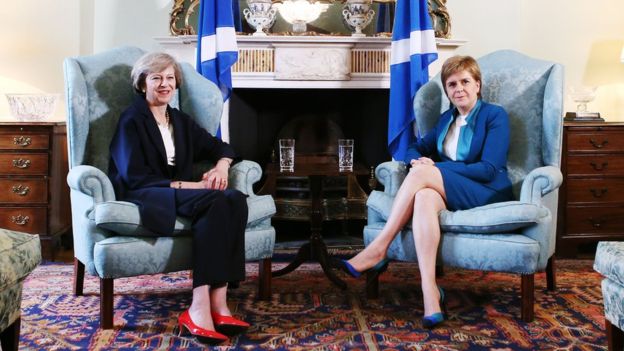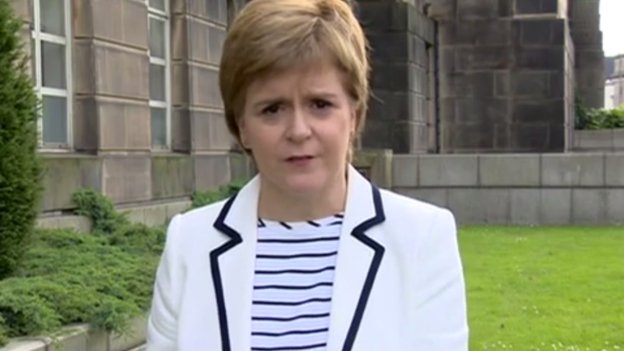Theresa May and Nicola Sturgeon meet for Brexit talks

Prime Minister Theresa May has held talks with First Minister Nicola Sturgeon in Edinburgh on the future of the EU and the union.
Mrs May left the first minister's official residence, Bute House, after about 45 minutes, following a meeting she described as "positive".
She said the Scottish government should be "fully engaged" in Brexit talks.
Ms Sturgeon believes Scottish interests have been put "at risk" by the UK's vote to leave the EU.
The Scottish government is seeking a separate deal on relations with the EU after the Brexit vote.
Speaking after the meeting, the prime minister said: "I'm willing to listen to options and I've been very clear with the first minister today that I want the Scottish government to be fully engaged in our discussion.
"I have already said that I won't be triggering Article 50 until I think that we have a UK approach and objectives for negotiations — I think it is important that we establish that before we trigger Article 50."
Earlier, she said her visit to Scotland demonstrated her commitment to "preserving this special union that has endured for centuries".
She added: "And I want to say something else to the people of Scotland too: the government I lead will always be on your side.
"Every decision we take, every policy we take forward, we will stand up for you and your family — not the rich, the mighty or the powerful.
"That's because I believe in a union, not just between the nations of the United Kingdom, but between all of our citizens."
Speaking on BBC Scotland's Good Morning Scotland programme, Scottish Secretary David Mundell described the idea of Scotland remaining within the UK at the same time as remaining in the EU as "fanciful".
He told the programme: "I certainly don't think it's possible for Scotland to remain within the EU and the rest of the UK to be outwith the EU. I think that is fanciful."
Mr Mundell said he believed both Nicola Sturgeon and Theresa May would have a "constructive" relationship and their collective aim would be to get the best deal for Scotland and the UK in the EU negotiations.
However, he warned: "Of course it's not going to be doable on a basis that satisfies Nicola Sturgeon's ultimate aim of making Scotland an independent country.
"Theresa May doesn't agree with Scotland being an independent country, I don't agree and two million people in Scotland who voted in our own referendum don't agree with that. So we're not going to be in agreement with that and we're not going to be in agreement with the idea that there should be another independence referendum."
Also speaking on the programme, the SNP MP Stephen Gethins, who is the party's spokesman on Europe, said he would like to see an acknowledgement from Westminster that Scotland voted differently from the UK referendum result.
He said: "We can find innovative political solutions to this if only the Westminster government are willing to listen."
He added: "You can find a solution whereby Scotland remains in the European Union within the United Kingdom, there are ways you can do that.
"Independence is also an option, but that's only one of a number of options that are being considered. But if you look at the way the European Union and the United Kingdom have found solutions over the past 40 years, I'd been very surprised if the political will is there, that they can't find a solution to this particular impasse at the moment."
'Protect and defend'
Speaking to Reporting Scotland on Thursday, Ms Sturgeon said she hoped she would encounter a prime minister who was "open-minded and constructive" about the options for Scotland.
The first minister said she wanted to find ways to protect areas including trade, university research, the rights of workers and influence on global policy such as climate change.
Политика конфиденциальности | Правила пользования сайтом








